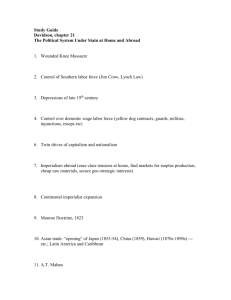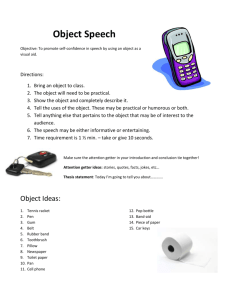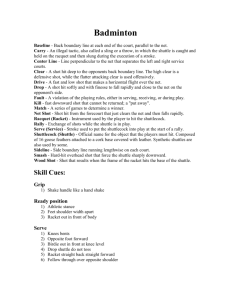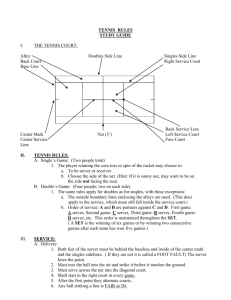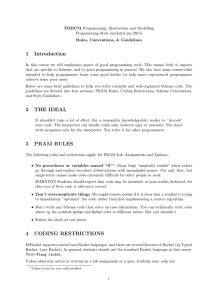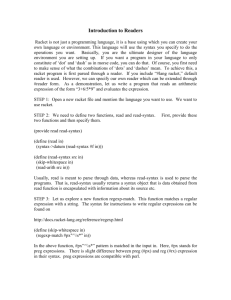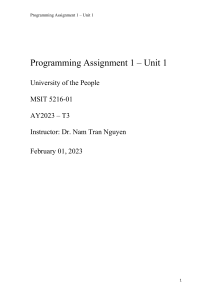Study Guide 8 The Rise of Smokestack America and Becoming a
advertisement
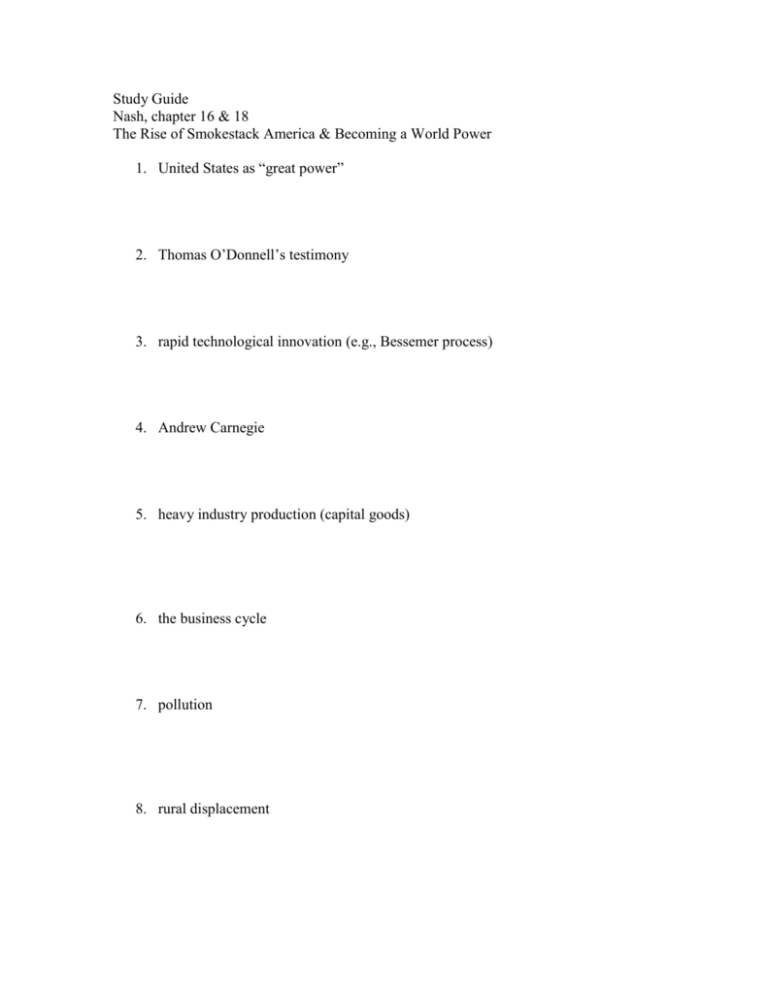
Study Guide Nash, chapter 16 & 18 The Rise of Smokestack America & Becoming a World Power 1. United States as “great power” 2. Thomas O’Donnell’s testimony 3. rapid technological innovation (e.g., Bessemer process) 4. Andrew Carnegie 5. heavy industry production (capital goods) 6. the business cycle 7. pollution 8. rural displacement 9. urbanization/urban planning (e.g., sanitation) 10. immigration (new immigrant waves) 11. ghettoization/separations: class, occupation and race (impact on wages and labor militancy) 12. African Americans in the north 13. widening gap between rich and poor 14. Jane Addams 15. steady rise of the middle class 16. middle-class women 17. Horatio Alger myth/upward mobility? 18. labor militancy and goals 19. Great Uprising of 1877 20. Knights of Labor (K of L) 21. American Federation of Labor (AFL) 22. Haymarket 23. Homestead Steel Strike 24. Pullman Strike 25. Eugene Debs & ARU Study Guide Nash, chapter 20 Becoming a World Power 1. Wounded Knee Massacre 2. Control of Southern labor force (Jim Crow, Lynch Law) 3. Depressions of late 19th century 4. Control over domestic wage labor force (yellow dog contracts, guards, militias, injunctions, troops etc) 5. Imperialism abroad (ease class tensions at home, find markets for surplus production, cheap raw materials, secure geo-strategic interests) 6. A.T. Mahan 7. Open door trade policies backed by force 8. Spanish American War, 1898 9. Cuba --- United Fruit, American Tobacco Co., Bethlehem Steel 10. Platt Amendment --- Cuban colonial vassalage 11. Puerto Rico, Wake Island, Guam, Philippines 12. Rudyard Kipling and The White Man’s Burden 13. President McKinley and Philippines annexation 14. Emilio Aguinaldo & Filipino insurrectos 15. Anti-Imperialist League 17. Mark Twain --- “We have pacified some thousands of the islanders and buried them; destroyed their fields; burned their villages, and turned their widows and orphans out of doors . . . And so, by these Providences of God --- and the phrase is the government’s, not mine --- we are a World Power.” 18. Roosevelt and the Panama Canal 19. Roosevelt Corollary 20. Banana Wars 21. Smedley Butler on Interventionism (Excerpt from a speech delivered in 1933, by Major General Smedley Butler, USMC. War is just a racket. A racket is best described, I believe, as something that is not what it seems to the majority of people. Only a small inside group knows what it is about. It is conducted for the benefit of the very few at the expense of the masses. I believe in adequate defense at the coastline and nothing else. If a nation comes over here to fight, then we'll fight. The trouble with America is that when the dollar only earns 6 percent over here, then it gets restless and goes overseas to get 100 percent. Then the flag follows the dollar and the soldiers follow the flag. I wouldn't go to war again as I have done to protect some lousy investment of the bankers. There are only two things we should fight for. One is the defense of our homes and the other is the Bill of Rights. War for any other reason is simply a racket. There isn't a trick in the racketeering bag that the military gang is blind to. It has its "finger men" to point out enemies, its "muscle men" to destroy enemies, its "brain men" to plan war preparations, and a "Big Boss" Super-NationalisticCapitalism. It may seem odd for me, a military man to adopt such a comparison. Truthfulness compels me to. I spent thirty- three years and four months in active military service as a member of this country's most agile military force, the Marine Corps. I served in all commissioned ranks from Second Lieutenant to Major-General. And during that period, I spent most of my time being a high class muscle- man for Big Business, for Wall Street and for the Bankers. In short, I was a racketeer, a gangster for capitalism. I suspected I was just part of a racket at the time. Now I am sure of it. Like all the members of the military profession, I never had a thought of my own until I left the service. My mental faculties remained in suspended animation while I obeyed the orders of higher-ups. This is typical with everyone in the military service. I helped make Mexico, especially Tampico, safe for American oil interests in 1914. I helped make Haiti and Cuba a decent place for the National City Bank boys to collect revenues in. I helped in the raping of half a dozen Central American republics for the benefits of Wall Street. The record of racketeering is long. I helped purify Nicaragua for the international banking house of Brown Brothers in 1909-1912 (where have I heard that name before?). I brought light to the Dominican Republic for American sugar interests in 1916. In China I helped to see to it that Standard Oil went its way unmolested. During those years, I had, as the boys in the back room would say, a swell racket. Looking back on it, I feel that I could have given Al Capone a few hints. The best he could do was to operate his racket in three districts. I operated on three continents.
